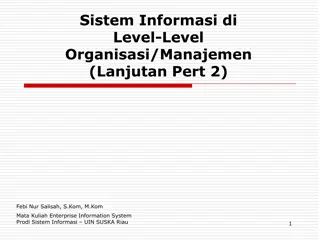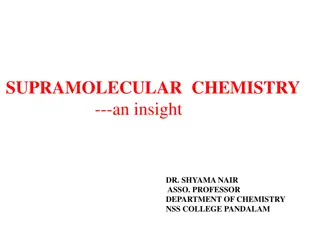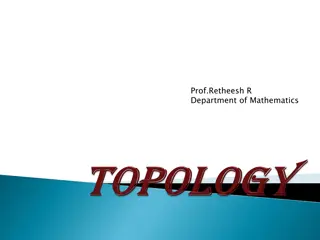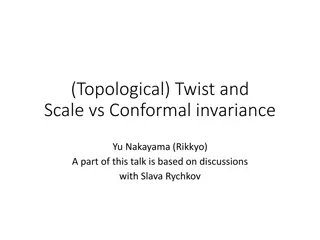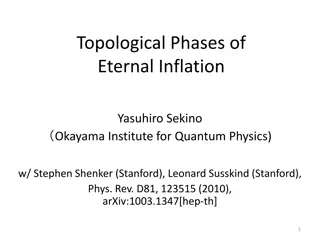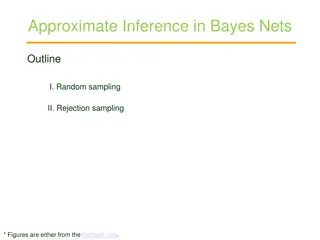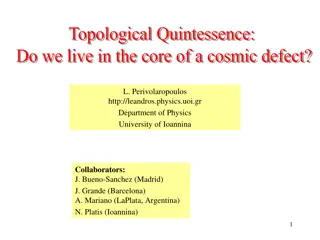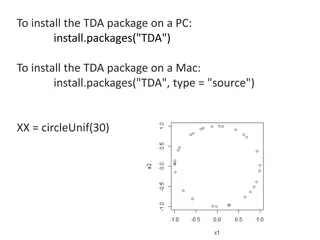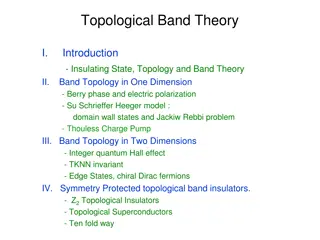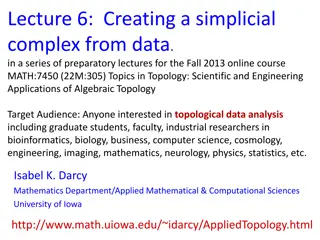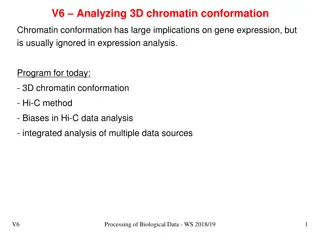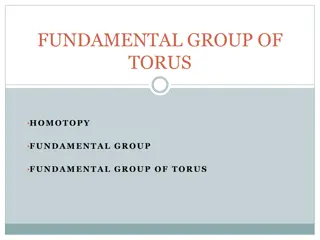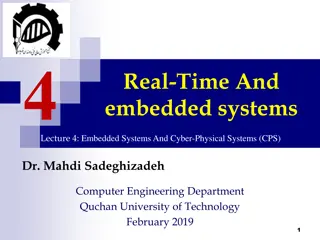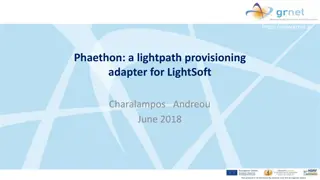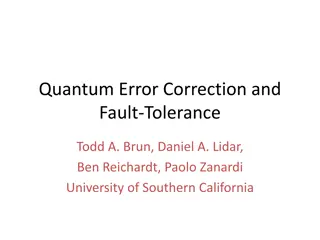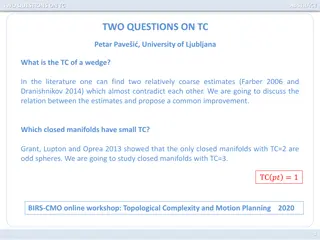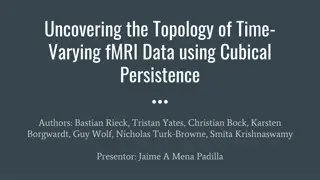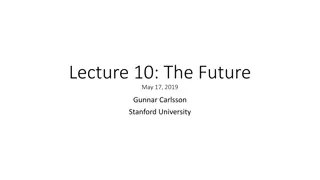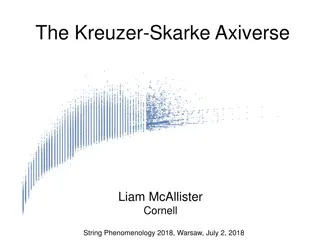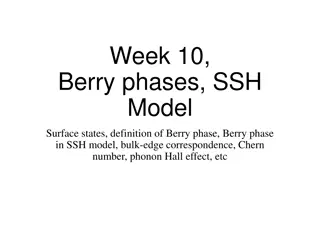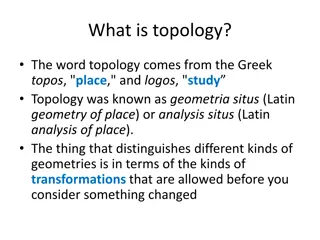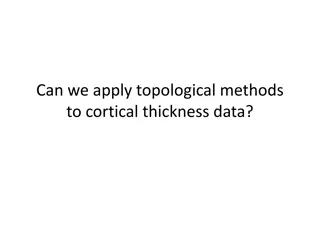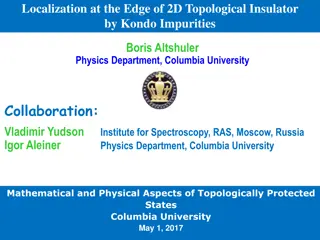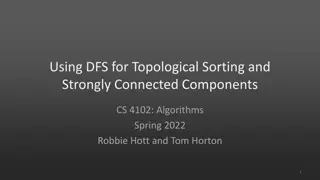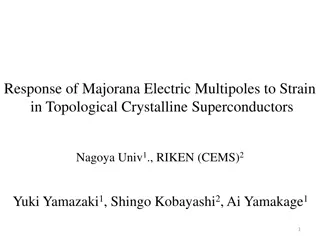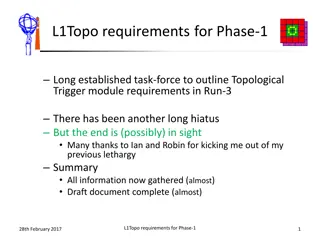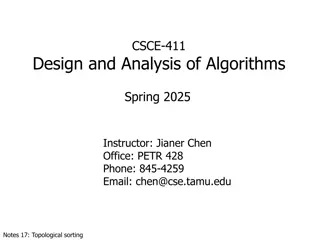Information Systems in Organizational Management
Management in organizations is divided into three levels: operational, tactical, and strategic. Each level requires different information systems to support various activities. Operational systems focus on routine transactions and control processes, while middle-level systems aid in semi-structured
11 views • 39 slides
Supramolecular Chemistry: Insights and Applications
Supramolecular chemistry delves into the chemistry of molecular assemblies, intermolecular bonds, and non-covalent interactions, leading to the formation of supra-molecules through aggregation of molecular subunits. Concepts like molecular recognition, self-organization, and host-guest chemistry pla
0 views • 18 slides
Bellman-Ford and Dynamic Programming on Graphs
Exploring Bellman-Ford and Floyd-Warshall algorithms, Dijkstra's Algorithm, shortest path problems, dynamic programming on graphs, and solving distances in a directed acyclic graph. Learn about recurrences, evaluation orders, topological sort, and handling cycles in graphs.
3 views • 39 slides
Introduction to Topological Spaces and Examples
Topology is the study of surfaces derived from Greek words meaning surface and discourse. In mathematics, a topological space is a set with a family of subsets satisfying specific properties. Examples include the open ball, open set, indiscrete topology, discrete topology, co-finite topology, and co
1 views • 14 slides
Combining Graph Algorithms with Data Structures and Algorithms in CSE 373 by Kasey Champion
In this lecture, Kasey Champion covers a wide range of topics including graph algorithms, data structures, coding projects, and important midterm topics for CSE 373. The lecture emphasizes understanding ADTs, data structures, asymptotic analysis, sorting algorithms, memory management, P vs. NP, heap
3 views • 38 slides
Scale vs. Conformal Invariance in Theoretical Physics
Delve into the intriguing concepts of scale invariance and conformal invariance in theoretical physics through discussions on topics such as topological twist, critical phenomena, unitarity arguments, and counterexamples. Explore the fine balance between these two powerful symmetries and their impli
0 views • 19 slides
Topological Phases of Eternal Inflation in Metastable Vacuum Theory
Exploring the coupling of gravity in a theory with metastable vacuum through the lens of topological phases of eternal inflation. Investigating the behavior of false and true vacua, de Sitter space, and bubble nucleation, offering insights into string theory landscapes and observational implications
1 views • 26 slides
Approximate Inference in Bayes Nets: Random vs. Rejection Sampling
Approximate inference methods in Bayes nets, such as random and rejection sampling, utilize Monte Carlo algorithms for stochastic sampling to estimate complex probabilities. Random sampling involves sampling in topological order, while rejection sampling generates samples from hard-to-sample distrib
0 views • 9 slides
Topological Quintessence: Anomalous Cosmic Anisotropies and Dark Flow Directions
The consistency of Cold Dark Matter (CDM) with observational data has improved over the past decade, but tensions remain with various cosmic anomalies such as preferred anisotropy axes and dark flow directions. Topological Quintessence, a physical mechanism proposed by L. Perivolaropoulos and collab
0 views • 26 slides
Information Systems in Organizations: Overview and Implementation
Information systems play a crucial role in organizations, encompassing transaction processing systems, functional area information systems, and enterprise resource planning systems. This content delves into the purpose of transaction processing systems, the support provided by information systems ac
3 views • 30 slides
Jeff Edmonds - Research Interests and Academic Courses
Jeff Edmonds is a researcher with interests in various theoretical and mathematical topics, including scheduling algorithms, cake cutting, and topological embeddings. He also provides support for mathematical and theoretical topics. Additionally, Jeff has ventured into machine learning to explore ne
1 views • 17 slides
Fractionalized Topological Insulators and Majoranas
This discussion delves into the transition from fractionalized topological insulators to fractionalized Majorana modes, highlighting key concepts in topological phases of matter, quantum Hall effects, and interactions in fractional quantum Hall effects. Emphasis is placed on 3D topological insulator
0 views • 23 slides
Topological Data Analysis (TDA) with Persistence Diagrams
Dive into the world of Topological Data Analysis (TDA) by learning how to install the TDA package on different operating systems and interpreting the plots of data points, barcodes, and persistence diagrams. Explore the visualization of cycles in different dimensions and understand the concepts of H
0 views • 17 slides
Exploring Topological Band Theory and Quantum Phases in Electronic Matter
Delve into the fascinating realm of topological band theory, examining the insulating state, band topology in different dimensions, symmetry-protected topological band insulators, and the interplay between symmetry and topology. Uncover the principles underlying matter symmetry, quantum phases, and
1 views • 29 slides
Introduction to Creating Simplicial Complexes from Data
Learn how to create a simplicial complex from data points through a step-by-step process. Starting with 0-dimensional vertices and defining closeness between data points, progress to adding 1-dimensional edges. Ideal for those interested in topological data analysis across various fields.
1 views • 73 slides
Insights into 3D Chromatin Conformation Analysis
Chromatin conformation analysis is crucial for understanding gene expression dynamics. Today's program covers topics such as 3D chromatin organization, Hi-C method, biases in Hi-C data analysis, and integrated analysis of data sources. Techniques like Chromosome Conformation Capture Technologies and
0 views • 34 slides
Homotopy and Fundamental Groups in Topology
Explore the concepts of homotopy and fundamental groups in topology, where objects with the same structure can be classified into classes, and the fundamental group characterizes loops. Discover the fundamental group of a torus, its identity elements, closure, associativity, and inverses. Homotopy a
1 views • 10 slides
Embedded Systems and Cyber-Physical Systems
Embedded systems are specialized computer systems embedded within larger systems, such as control systems and car controllers. This lecture covers real-time aspects, applications of Cyber-Physical Systems (CPS), and examples like the Boeing 777/Airbus A380 cockpit. It discusses the design process of
1 views • 22 slides
Topological Sorting in Spark GraphX
Explore the essential concepts of Topological Sorting in Spark GraphX, including necessary background knowledge, stand-alone versus distributed implementations, and practical examples. Delve into Spark GraphX's capabilities, such as RDD manipulation, high-level tools, and graph parallel computation.
0 views • 56 slides
Overview of Phaethon: LightPath Provisioning Adapter for LightSoft
Phaethon is a lightpath provisioning adapter designed for LightSoft, providing capabilities such as reconfigurable optical add-drop multiplexing and transponder filtering. It integrates with the GRNET OSS/BSS stack and facilitates operations like transforming CORBA calls to HTTP REST calls and manag
0 views • 25 slides
Quantum Error Correction and Fault Tolerance Overview
Quantum error correction and fault tolerance are essential for realizing quantum computers due to the challenge of decoherence. Various approaches, including concatenated quantum error correcting codes and topological codes like the surface code, are being studied for fault-tolerant quantum computin
0 views • 19 slides
Topological Complexity Estimations and Regularity of Spaces
Discussion on the varying estimates of topological complexity for wedges, closed manifolds, and other spaces, along with the analysis of TC-regularity. This includes contrasting estimates, proofs, and examples of TC regularity in different spaces like spheres and Lie groups.
0 views • 11 slides
Uncovering the Topology of Time-Varying fMRI Data using Cubical Persistence
Authors present a novel framework to transform time-varying fMRI data into topological representations, utilizing cubical persistence to analyze brain state trajectories and cluster participants based on topological features in blood flow in the brain, providing insights into cognitive processes. fM
0 views • 11 slides
Advanced Topics in Topological Data Analysis: Research Highlights
Explore cutting-edge research in Topological Data Analysis (TDA) through topics such as Mapper Stability Measures, Deep Learning advancements, Vectorization techniques, Generalized Persistence modeling, Stochastic Aspects analysis, Formal Properties of Persistence, and Complement Problems in TDA app
0 views • 8 slides
The Kreuzer-Skarke Axiverse
In this research, the focus is on exploring ensembles of explicit compactifications of string theory to refine or support conjectures about de Sitter solutions, field ranges, and more. By generating a large ensemble of 4d effective quantum gravity theories through the analysis of Kreuzer-Skarke subs
0 views • 53 slides
Applications of Depth-First Search in Graph Topology
Discover the significance of graph topology and the applications of Depth-First Search (DFS) in laying out data for interpretation. Learn about topological sorting, Directed Acyclic Graphs (DAGs), and the correctness of topological sort.
1 views • 17 slides
Week 10: Berry Phases, SSH Model, Bulk-Edge Correspondence
Concepts of Berry phases, SSH model, surface states, Chern number, phonon Hall effect, bulk-edge correspondence, and more. Dive into the SSH model as a topological insulator, special limits, scattering states vs. edge states, and the bulk-edge correspondence in winding numbers.
0 views • 20 slides
Introduction to Topology: Understanding Geometric Transformations
Topology, derived from the Greek words for "place" and "study," explores geometric transformations through the concept of topological equivalence, distinguishing shapes based on deformations that do not involve tearing or scattering. Discover the fundamental principles of topology, such as topologic
0 views • 19 slides
From Natural Images to MRIs: Using TDA to Analyze Image Data
Analyze image data using topological methods in brain network analysis. Explore the transition from natural images to MRIs and the application of TDA on image datasets. Presented by Maria Gommel of University of Iowa on May 10, 2017.
0 views • 12 slides
Applying Topological Methods to Cortical Thickness Data
Topological methods have been utilized to analyze differences in cortical thickness, particularly in individuals with autism. This involves using Python code to obtain necessary data files, calculating simplicial complexes, and visualizing persistence plots. The next steps involve computing these pl
0 views • 6 slides
Topological Phase Transitions Seminar
This seminar on topological phase transitions, presented by Melda Akyazi, covers topics like XY model, spin wave approximation, vortices, experimental realization, and more. It discusses N-Vector models, Ising model, XY model, Heisenberg model, and the characterisation of phase transitions based on
0 views • 40 slides
Localization at the Edge of 2D Topological Insulator Studies
Study explores mathematical and physical aspects of topologically protected states in 2D topological insulators. Focus on localization behavior at the edge, impact of Kondo impurities, insights into chiral edge states, and resistance to disorder. Discussions on chiral edge states, backscattering, an
0 views • 55 slides
Innovative Clustering Algorithms and EIC Recon Integration
The update from UConn-RIKEN highlights discussions with UC Riverside on clustering approaches for separating particles. The meeting explored low-level topological clustering alongside high-level GNN (ML) clustering. Challenges in distinguishing photons from neutrons were addressed, emphasizing the n
0 views • 5 slides
Exploring Topological Insulators and Hall Effects
Delve into the world of topological insulators and their close relation with various Hall effects, from the history and band theory to the emergence of 2D and 3D topological insulators. Understand the significance of the Chern invariant and how it ties into the topological nature of these materials.
0 views • 30 slides
Understanding Greedy Algorithms for Scheduling Theory in CSE 417
Dive into the concepts of Greedy Algorithms and Scheduling Theory in CSE 417. Explore topics like Interval Scheduling, Topological Sort Algorithm, and the application of Greedy Algorithms for task scheduling. Enhance your understanding with examples and simulations to solve complex scheduling proble
0 views • 24 slides
Understanding Topological Sorting and Strongly Connected Components
Explore the concept of topological sorting in directed acyclic graphs, learn about allowable orderings in CS classes, and see how Depth-First Search can be used for topological sorting and finish times. Understand the algorithm strategy and modified DFS functions for topological sorting. Discover fo
0 views • 21 slides
Response of Majorana Electric Multipoles to Strain in Topological Crystalline Superconductors
Investigate the response of Majorana electric multipoles to strain in topological crystalline superconductors. Explore the behavior of Majorana fermions, tunneling conductance, time-reversal symmetry, and the implications of external magnetic fields on Majorana Kramers pairs. Understand the detectio
0 views • 11 slides
Mean-Field Approach in Topological Superconductivity: A Critical Review
Explore the limitations of the mean-field approach in topological superconductivity, challenging the basis on spontaneously broken U(1) gauge symmetry and its implications on Majorana fermions. The discussion delves into corrections needed and the impact on established results, questioning the exist
1 views • 16 slides
Topological Trigger Module Requirements in Run-3 Overview
Dive into the long-established task force's outline of Topological Trigger module requirements for Run-3, with a detailed look at Topo input numerology, FEXes, MUCTPI Trigger requirements, and more. Explore the connectivity within the current and upgraded designs while addressing commissioning perio
0 views • 39 slides
Design and Analysis of Algorithms: Topological Sorting and DFS on Directed Graphs
Explore the concepts of topological sorting and depth-first search (DFS) on directed graphs in the context of designing and analyzing algorithms. Learn about adjacency matrices, adjacency lists, running time complexities, and how to order vertices in a directed graph for efficient processing.
0 views • 26 slides
